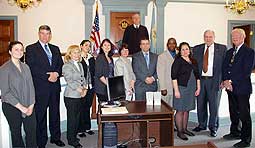Veterans Treatment Court

Veterans Treatment Court Program Manual
Superior Court of Delaware Veterans Treatment Court which began February, 2011 as the first statewide program as well as the first to have both a diversion and a probation track has now published a fifty-five page comprehensive, in-depth program manual.
The Veterans Treatment Court mission is to divert veterans, who meet strict requirements, from the traditional criminal justice system and provide them with the tools to lead a productive and law-abiding life.
Studies show that such collaborative courts enhance public safety, cut recidivism and are more cost effective than the typical manner of processing offenders.
The value of Veterans Treatment Court has already been recognized in other jurisdictions.
In the first Veterans Treatment Court in Buffalo, NY, the recidivism rate is under 20%.
According to the 70% of the veterans finish the programs, and 75% are not rearrested within two years.

Superior Court held its first session of its statewide Diversionary Veterans Treatment Court on February 18, 2011 in Kent County. Resident Judge William L. Witham Jr. oversees the Veterans Court. View Judge Witham's Veterans Court Opening Comments
The Veterans Court involves the Delaware Superior Court, Department of Veterans Affairs, Department of Justice, Office of Public Defender and the Treatment Access Center. Read about the launch of Delaware's first Veteran's Treatment Court in this 2011 press release
The court is presided over by Superior Court Judge William L. Witham Jr. and will serve veterans throughout the state, including both those charged with new offenses and those charged with violation of probation. It is the first statewide veteran's court in the nation.
Judge Witham related that, "we anticipate that the court process, along with the treatment options offered by the VA and TASC and the support of the volunteer mentors will provide veterans involved in the criminal justice system with the means to address their problems and to move on to constructive lives in our community."
Based on the drug and mental health court models, the court will work with veterans referred to it by the Attorney General's Office or the Office of the Public Defender. Once a referral is made, the veteran is offered the opportunity to participate in the Court on a voluntary basis.
If the veteran chooses to participate, the veteran will have his or her charges deferred pending successful completion of a treatment plan, at which time the charges will be dismissed. To reach this point, veterans must comply with court ordered treatment and appear in court for progress assessments on a regular basis. Failure to comply will result in sanctions which can range from an admonishment all the way to termination from the program.
The goal of Veterans Court is to divert veterans with mental illness who are charged with nonviolent felonies and misdemeanor crimes away from jail and into rehabilitative programs. Veterans in the program must attend regular court status conferences, participate in the development of their treatment plans, and engage in community groups as required. After completion of the program, prosecution for the offense will not proceed and the charges will be dismissed.
Stressful combat duty in Iraq and Afghanistan do not necessarily end for veterans after they return home. Many return with post-traumatic stress syndrome or other mental health issues. In addition, there may be drug or alcohol abuse caused or exacerbated by their military service. Now home, they may have difficulty with readjustment to civilian life and become involved in criminal activity. The U.S. Department of Justice estimates that approximately 10% of adults arrested have served in the military.
Delaware veterans in this situation have the opportunity to participate in a new court that can help address the mental health and addiction issues that led to their involvement in the criminal justice system.
To support veterans through this process, volunteer mentors, who are also veterans, will help the court participants get to appointments and undertake other necessary steps. According to Judge Witham, himself a veteran, "The volunteer mentors are a crucial part of the process because they understand the stresses of military life and can offer necessary understanding, assistance and support through the difficult process of recovery."
Assistance will also be provided by the Veterans Administration which is providing a coordinator who will determine eligibility for veteran's benefits and will help them enroll in programs and services needed to comply with court orders and to otherwise get their lives back in order. For those who are determined not to be eligible for Veterans Administration benefits, the Treatment Access Center (TASC) will provide similar treatment services.
Although the court has just begun all of those involved in its development anticipate that it will be a tremendous benefit to both participating veterans and the state as a whole.
